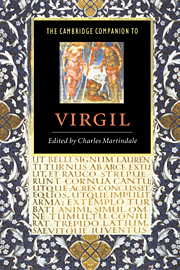Book contents
- Frontmatter
- Contents
- List of illustrations
- List of contributors
- Preface
- 1 Introduction: ‘The classic of all Europe’
- Part 1 Translation and reception
- Part 2 Genre and poetic career
- 8 Green politics: the Eclogues
- 9 Virgilian didaxis: value and meaning in the Georgics
- 10 Virgilian epic
- 11 Closure: the Book of Virgil
- Part 3 Contexts of production
- Part 4 Contents and forms
- Dateline compiled by Genevieve Liveley
- List of works cited
- Index
- Plates
11 - Closure: the Book of Virgil
from Part 2 - Genre and poetic career
Published online by Cambridge University Press: 28 May 2006
- Frontmatter
- Contents
- List of illustrations
- List of contributors
- Preface
- 1 Introduction: ‘The classic of all Europe’
- Part 1 Translation and reception
- Part 2 Genre and poetic career
- 8 Green politics: the Eclogues
- 9 Virgilian didaxis: value and meaning in the Georgics
- 10 Virgilian epic
- 11 Closure: the Book of Virgil
- Part 3 Contexts of production
- Part 4 Contents and forms
- Dateline compiled by Genevieve Liveley
- List of works cited
- Index
- Plates
Summary
The Virgilian Vitae impose on the poet's life a strong pattern of linear development, a teleology which constructs the Aeneid as the simultaneous closure - ideological and narrative - of Virgil's life and his writings. Within this pattern, which distinguishes Virgil from his contemporaries and makes of him a paradigm for his successors, the Eclogues, the Georgics, and the Aeneid become part of one text, which we might call 'the Book of Virgil', or (referring to the development from the relatively modest beginning in the short Eclogues to the final project of the Aeneid) 'the poetic career'. In the Middle Ages for instance, the biographical sequence found in the Vitae, which links the heroic epic with its bucolic and didactic predecessors, is mapped onto a hierarchy not only of literary genres but also of social rank: the Rota Virgilii (the 'Wheel of Virgil'). Here, the triadic career is pictured in the form of concentric circles, a quasi-cosmic image, in which the texts of Virgil come to stand for all possible forms of human life and expression. The notion of the career, a triadic biography to match the triadic oeuvre, may also be found in the well-known epitaph quoted by Donatus:
Mantua me genuit, Calabri rapuere, tenet nunc Parthenope; cecini pascua rura duces.
Mantua bore me, Calabria took me away, and now Parthenope holds me. I sang of pastures, agriculture, and of leaders.
(Vita Donati 36)- Type
- Chapter
- Information
- The Cambridge Companion to Virgil , pp. 155 - 166Publisher: Cambridge University PressPrint publication year: 1997
- 8
- Cited by



